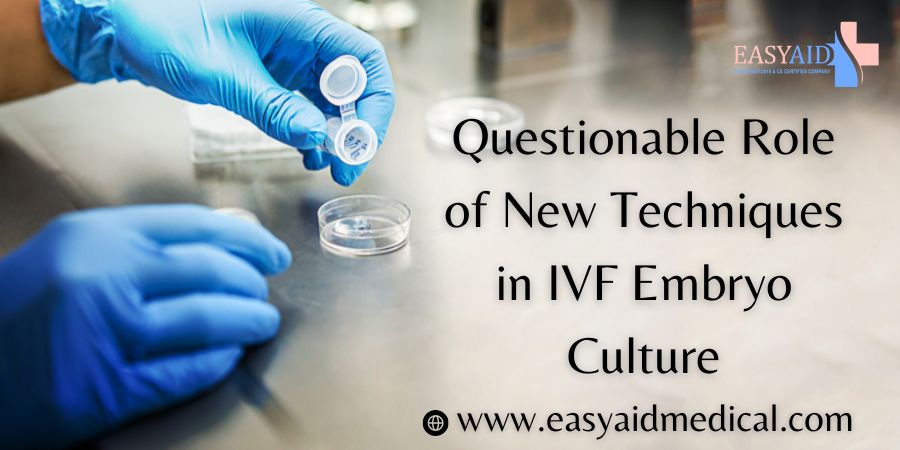IVF is a procedure to treat infertility that allows you to get pregnant when other ways of conceiving for pregnancy are unsuccessful. To prevent any inheritable diseases, assuming parents do have any, IVF is also utilized to stop genetic disorders from being transmitted down from spouses to their children.
Mature eggs are taken away from female reproductive organs’ ovaries and fertilized in a laboratory by sperm during in vitro fertilization (IVF). Afterward, the procedure is used to fertilize the eggs, referred to as embryos, within the uterus, which handles the baby’s growth. An IVF treatment takes anywhere from two to three weeks to complete altogether.
For the best IVF medication, Sehgal Nursing Home, IVF clinic in Delhi, addresses the best services with the modern approach of new techniques in trend with specialized treatment guidance from experienced fertility doctors.

New Techniques in IVF Embryo Culture
These are a few positive advances in the sector that could improve success rates and ultimately result in healthier leads by 2024.
Artificial Intelligence (AI) In IVF
AI is vital for the process of selecting embryos. Artificial intelligence (AI) technologies can examine thousands of embryo pictures and determine which ones have the best prospects of being successfully inserted, increasing embryo selection accuracy. It can also predict the genetic score for the embryo by the identical technique.
In IVF, levels of hormones are essential. Continuous tracking of hormonal deviations using devices with artificial intelligence allows doctors to modify dosages of medications quickly.
AI is capable of analyzing time-lapse images and videos of developing embryos. With the help of this technology, the growth of embryos may be continuously monitored, which enhances decision-making on the exact moment of embryo transplants. AI can offer an accurate, complete report on semen independent of the observer. This reduces the possibility of a wrong diagnosis and report.
Stem Cell Treatment
Using stem cells in IVF could assist with problems with infertility. The reproductive system might gain from stem cells’ support with tissue renewal and repair, increasing the probability of effective embryo implantation and later pregnancy. Furthermore, underlying medical conditions such as endometriosis or uterine anomalies that might result in infertility may be addressed through embryonic stem cell IVF.
The procedure helps in the growth of haploid sperm cells from the germ cells to the tubes in the testicles. It begins with stem cells replicating through mitosis, which allows the testes to produce more cells from sperm than usual. In this way, the human number of sperm has increased by several millions.
Laser Assisted Hatching
A fertilized egg might discover it more straightforward to “develop” or break through its outer layer, or “shell,” a membrane termed the zona pellucida, which is a hole created by a scientific IVF treatment known as laser-assisted hatching. The freezing and thawing cycle is one factor that contributes in some instances when this layer is abnormally thick and brittle.
The embryo has greater chances of following or placing into the uterus wall the easier it is to hatch. For pregnancy to occur, the embryo must hatch and be implanted; a laser-assisted hatch can be highly beneficial in achieving these vital phases.
Cryopreservation
The process of freezing embryos to preserve them for use in the future, frequently associated with in vitro fertilization (IVF), is known as embryo cryopreservation, also referred to as embryo banking or embryo freeze. Through in vitro fertilization (IVF), the eggs and sperm are put together in a lab to generate babies from the eggs removed from the female’s ovaries. After that, the embryos remain frozen, but the woman’s uterus can receive them once they have thawed.
Preimplantation Genetic Screening
Preimplantation genetic testing for the condition (PGT-A), frequently referred to as preimplantation genetic screening (PGS), is a prenatal genetic diagnostics procedure that evaluates the chromosome condition of embryos generated throughout in vitro fertilization (IVF). PGS may decrease the possibility of an unsuccessful IVF cycle and miscarriage by making sure the embryo selected for transfer has an appropriate amount of chromosomes
Robotic Technology and Nanobots
Several functionalities are included in the idea of Robotic Technology and Nanobots
in vitro fertilization (IVF), including the capacity to control gametes, which are testosterone and eggs, deliver medications to specific targets, establish controlled conditions, observe in real-time, and explore the reproductive context.
Why is Sehgal Nursing Home the best IVF clinic in Delhi?
One of the top fertility clinics in Delhi is the Sehgal Nursing Home, the most significant IVF clinic in Delhi. Thousands of infertile couples have found comfort and help at our nursing home for over ten years. The team of skilled and committed medical professionals is available and strives hard to address your needs and requirements promptly, courteously, and efficiently.
Moreover, we offer a variety of therapies to couples experiencing infertility, including PCOS, gynecology, the hymen, and infertility treatment. We are recognized as the Best Women Hospital in Delhi, treats around 2000 workers, more than 250 doctors and nurses, and over 10,000+ prescribed medicines for pregnancy altogether.
